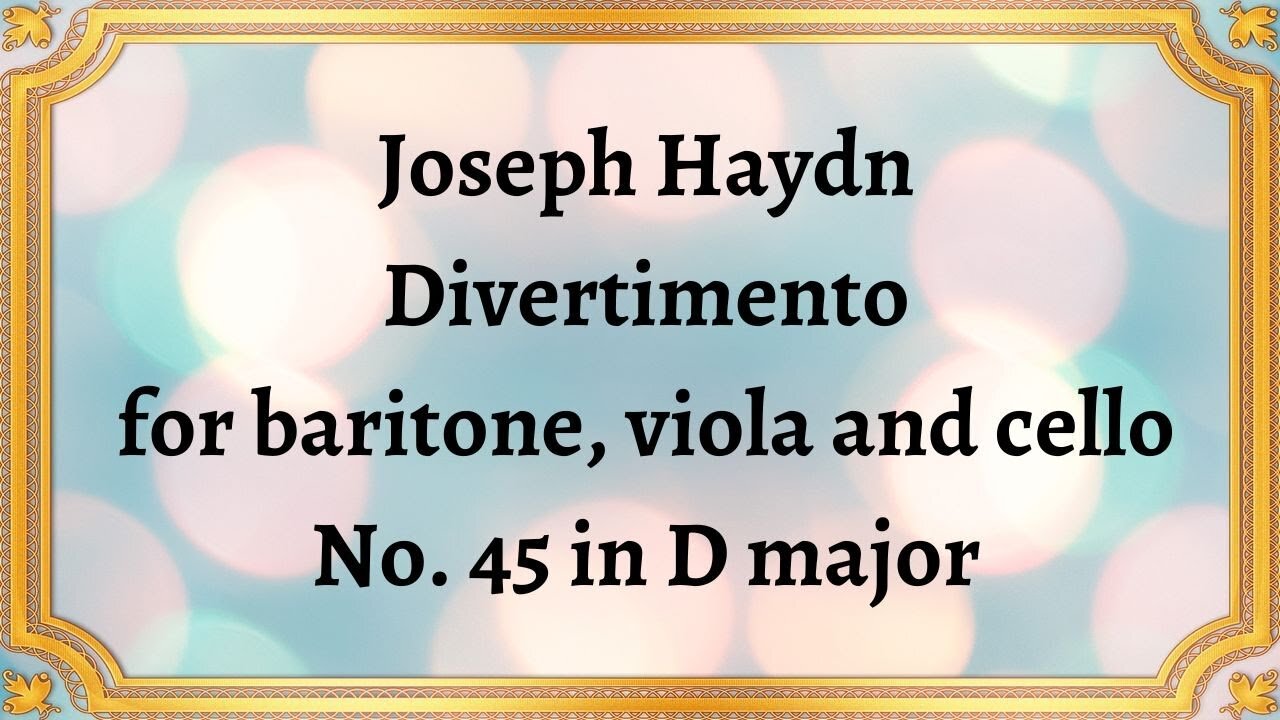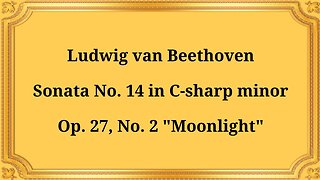Premium Only Content

Joseph Haydn Divertimento for baritone, viola and cello No. 45 in D major
#JosephHaydn #Divertimento #Baritone #Viola #Cello #Dmajor #chambermusic #Moderato #Menuet #Presto #classicalmusic #instrumentation #musiccomposition
Joseph Haydn is one of the most significant composers of the Classical era, and he is known for his outstanding contributions to a variety of genres, including opera, symphony, keyboard music, and chamber music. The Divertimento for Baritone, Viola, and Cello No. 45 in D major is an exceptional example of Haydn's expansive chamber music repertoire.
The Divertimento for Baritone, Viola, and Cello No. 45 in D major was composed in 1769 for Prince Nikolaus Esterházy. The baritone, also known as a baryton, is an obsolete instrument similar to a cello, but with added sympathetic strings that are plucked by the performer with the left thumb. The D major Divertimento, with its charming and playful melodies, highlights the unique timbres, specific tunings, and techniques that suit this obsolete instrument.
The D major Divertimento is a three-movement work that opens with a graceful and lovely Moderato. This movement is characterized by its charming and upbeat melody played by the baryton, which sets the tone for the piece. The second movement, marked Menuet, is a dainty and elegant dance that features a lively melody and elegant rhythms. This section is played in a trio form consisting of the baryton, the viola, and the cello, which creates a divided and symmetrical sound that showcases the sonorousness of the individual instruments.
The third and final movement, marked Presto, is a quick and light-hearted close to the work. This movement starts with a brisk and energetic melody played by the viola, followed by a similar theme played by the baryton. The Presto section features rapid and precise note passages that showcase the technical prowess of the performers.
Overall, the Divertimento for Baritone, Viola, and Cello No. 45 in D major is a superb example of Haydn's musical genius, featuring his effortlessly shifting melodies, clever subtleties, and innovative compositional techniques. The pieces' unique instrumentation combines all three instruments in a manner that creates a sound that is both distinct and delightful. The D major Divertimento remains a staple in the chamber music repertoire and continues to be adored by audiences worldwide.
In conclusion, the Divertimento for Baritone, Viola, and Cello No. 45 in D major remains a testament to Joseph Haydn's talent and his role in the development of the chamber music genre.
You have the opportunity to support the channel https://destream.net/live/RadSiarAl/donate
-
 18:26
18:26
Classical music_Music Inspiration
1 month agoLudwig van Beethoven Sonata No. 14 in C-sharp minor, Op. 27, No. 2 "Moonlight"
701 -
 LIVE
LIVE
VINCE
1 hour agoThe Hunter Biden Interview That BROKE The Internet | Episode 90 - 07/22/25
31,383 watching -

Dear America
1 hour agoOBAMA IS DONE!! Everything Is Coming Out!! Tulsi Drops 230K MLK DOCS!!
33K78 -
 LIVE
LIVE
Badlands Media
5 hours agoBadlands Daily: July 22, 2025
3,091 watching -
 LIVE
LIVE
Wendy Bell Radio
5 hours agoDemocrats Go Down In Flames
9,628 watching -
 LIVE
LIVE
Matt Kohrs
9 hours agoMarket Open: LIVE! Trading $1M & Breaking Stock News
1,018 watching -
 25:51
25:51
Clownfish TV
5 hours agoColbert Lost CBS $40 to $50 MILLION Per Year?!
4392 -
 LIVE
LIVE
The Mike Schwartz Show
55 minutes agoTHE MIKE SCHWARTZ SHOW with DR. MICHAEL J SCHWARTZ 07-22-2025
4,229 watching -
 LIVE
LIVE
LFA TV
12 hours agoLFA TV ALL DAY STREAM - TUESDAY 7/22/25
3,057 watching -
 1:21:54
1:21:54
JULIE GREEN MINISTRIES
3 hours agoEXPOSING AND BRINGING DOWN WHO REALLY CONTROLS THE ESTABLISHMENT IN DC
99.4K126